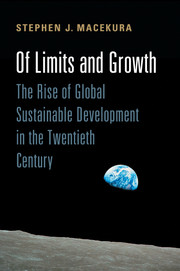Book contents
- Frontmatter
- Contents
- List of Illustrations
- Acknowledgments
- Introduction: NGOs and the Origins of “Sustainable Development”
- PART ONE ORIGINS
- PART TWO REFORMS
- 4 When Small Seemed Beautiful: NGOs, Appropriate Technology, and International Development in the 1970s
- 5 Leveraging the Lenders: The Quest for Environmental Impact Statements in the United States and the World Bank
- 6 Conservation for Development: The World Conservation Strategy and the Rise of Sustainable Development Planning
- PART THREE PERSISTENT PROBLEMS
- Conclusion: The Growth and Limits of NGOs
- Archives
- Index
5 - Leveraging the Lenders: The Quest for Environmental Impact Statements in the United States and the World Bank
from PART TWO - REFORMS
Published online by Cambridge University Press: 05 July 2015
- Frontmatter
- Contents
- List of Illustrations
- Acknowledgments
- Introduction: NGOs and the Origins of “Sustainable Development”
- PART ONE ORIGINS
- PART TWO REFORMS
- 4 When Small Seemed Beautiful: NGOs, Appropriate Technology, and International Development in the 1970s
- 5 Leveraging the Lenders: The Quest for Environmental Impact Statements in the United States and the World Bank
- 6 Conservation for Development: The World Conservation Strategy and the Rise of Sustainable Development Planning
- PART THREE PERSISTENT PROBLEMS
- Conclusion: The Growth and Limits of NGOs
- Archives
- Index
Summary
On September 29, 1986, two seasoned rock climbers affiliated with the Rainforest Action Network, an activist non-governmental organization (NGO) founded by firebrand activist Randy “Hurricane” Hayes, scaled the walls of a building adjacent to the World Bank and IMF offices in Washington, DC. As they neared the roof, they unfurled a giant banner emblazoned with the phrase “World Bank destroys tropical rain forests.” The incident occurred amid a tense campaign against the World Bank that sought, among other demands, to make the organization produce detailed assessments of the environmental effects for each project it funded. While the bank was already required to do so, environmentalists charged that the reports had been weak, ineffective, or ignored. Activists argued that the bank needed to adopt stricter regulations and review procedures that would allow more thorough public oversight of its activities. Bank officials rejected the charges. They claimed that a more elaborate system of assessments would stifle the lending process and ultimately interfere with the right of countries receiving aid to pursue development on their own terms. “We're dealing with governments that are proud of their sovereignty,” a bank spokesperson said in response to the protest banner. “What is a priority in Washington,” he continued, was “not the case” in countries yearning for big projects to spur economic growth. He implied that adopting robust review procedures for all projects would unjustly undermine other nations' sovereignty in the name of environmental imperatives defined by activists in the United States.
The protests against the World Bank over environmental assessments marked another significant reform effort by activists to reconcile environmental concerns with development practice. While promoting appropriate technologies represented one way that NGOs attempted to reform development policy, environmentalists also sought to alter how lending agencies funded projects in the first place. In particular, over the 1970s and 1980s a new generation of NGOs first pressured the U.S. government and then the World Bank to incorporate formal environmental reviews – particularly environmental impact statements (EIS) – in the project approval process.
At first glance, the procedural shift generated by the presence of an environmental assessment may seem arcane, dryly technical, or insignificant. The EIS was a bureaucratic reform that required ecologists or other scientific authorities to review and assess the potential environmental impact of any proposed development project.
- Type
- Chapter
- Information
- Of Limits and GrowthThe Rise of Global Sustainable Development in the Twentieth Century, pp. 172 - 218Publisher: Cambridge University PressPrint publication year: 2015

